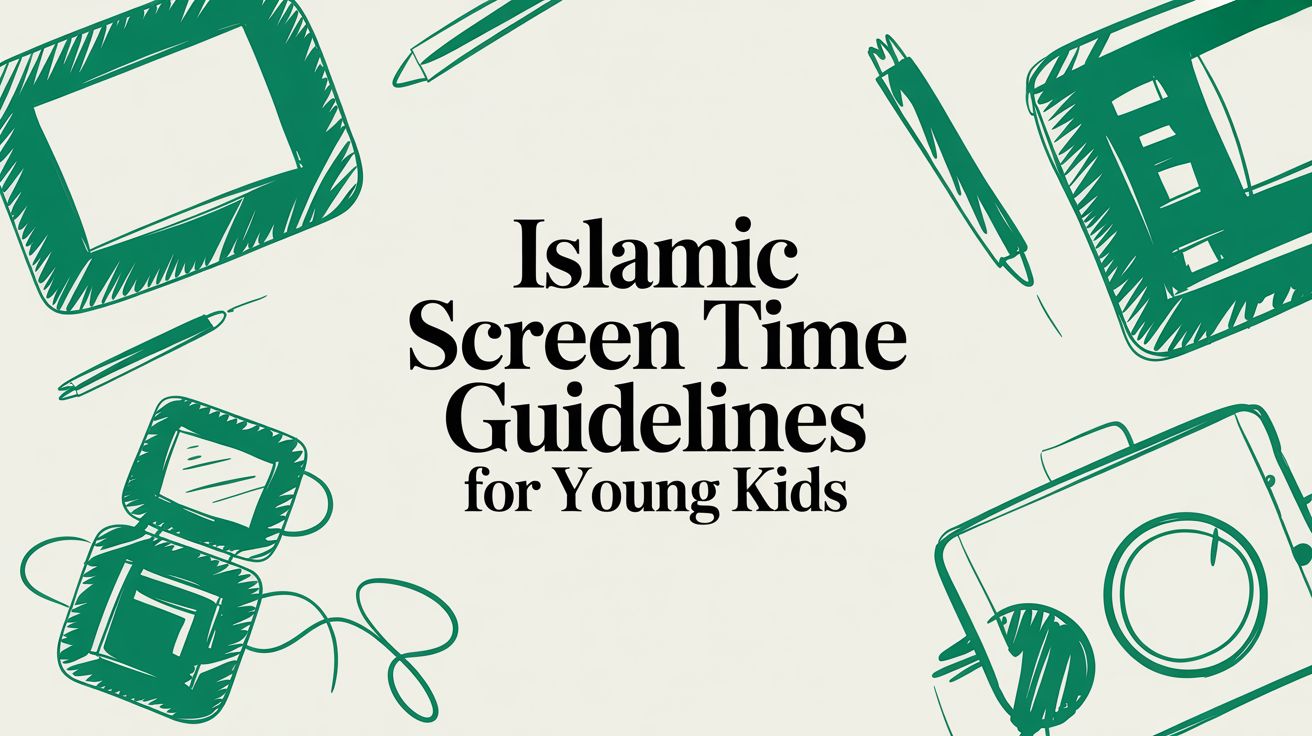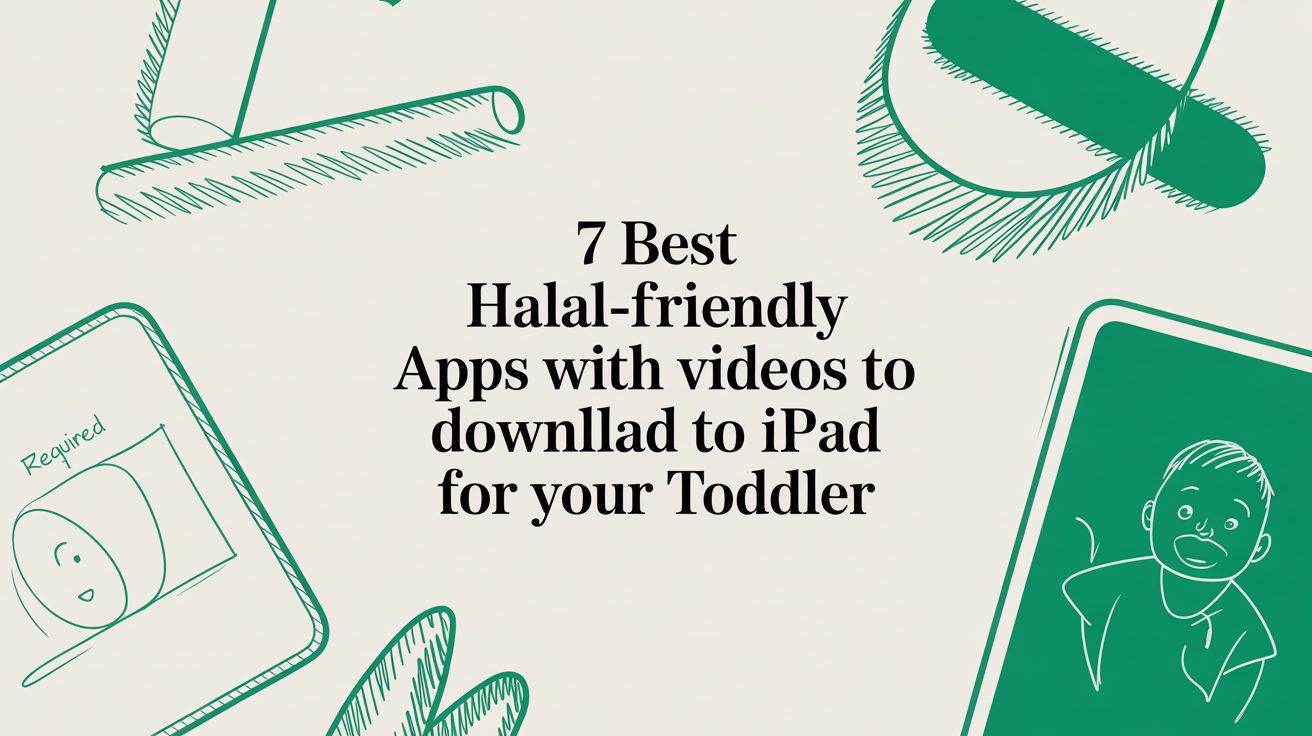Figuring out screen time for your little one, especially when you want to ground their upbringing in Islamic values, can feel like navigating a minefield. The fundamental principle behind Islamic screen time guidelines for children from birth to age three is refreshingly simple: less is more. It's all about safeguarding their natural, God-given disposition (fitra) by making sure real-world play, human connection, and exploration come first.
Faith and Screens: A Guide for Muslim Parents of Little Ones
As a Muslim parent of a baby or toddler, your plate is always full. Sometimes you just need a few minutes to pray Salah in peace, get Iftar on the table before Maghrib, or just take a moment to breathe while your toddler is safely occupied. In those moments, a screen can feel like a lifesaver. This guide gets that. We’re not here to add another layer of guilt; we’re here to offer practical, faith-based support.
We see the pressure you're under. The goal isn't to demonise screens but to treat them as modern tools that need clear, faith-based rules. It's about being intentional, not about being perfect. For our youngest children aged 0–3, this means carefully creating a media environment that nurtures them spiritually, emotionally, and mentally, right from the start.
Why Intentional Limits Matter So Much
Setting clear boundaries around screens for babies and toddlers is one of the most direct ways to protect their healthy development. It’s not just a hunch; global research is sounding the alarm on kids’ screen time, and Islamic perspectives provide a solid framework for how to respond. For instance, one major study found a strong link between too much screen time and problems with concentration and sleep in young children. The researchers' conclusion? Kids under three should ideally have no exposure to screen media—a recommendation that fits perfectly with Islamic teachings on moderation and a parent's duty of care. You can read more about these Islamic perspectives on children's media use to dig deeper.
This visual breakdown gives a great at-a-glance summary of the recommended stages for introducing screens.
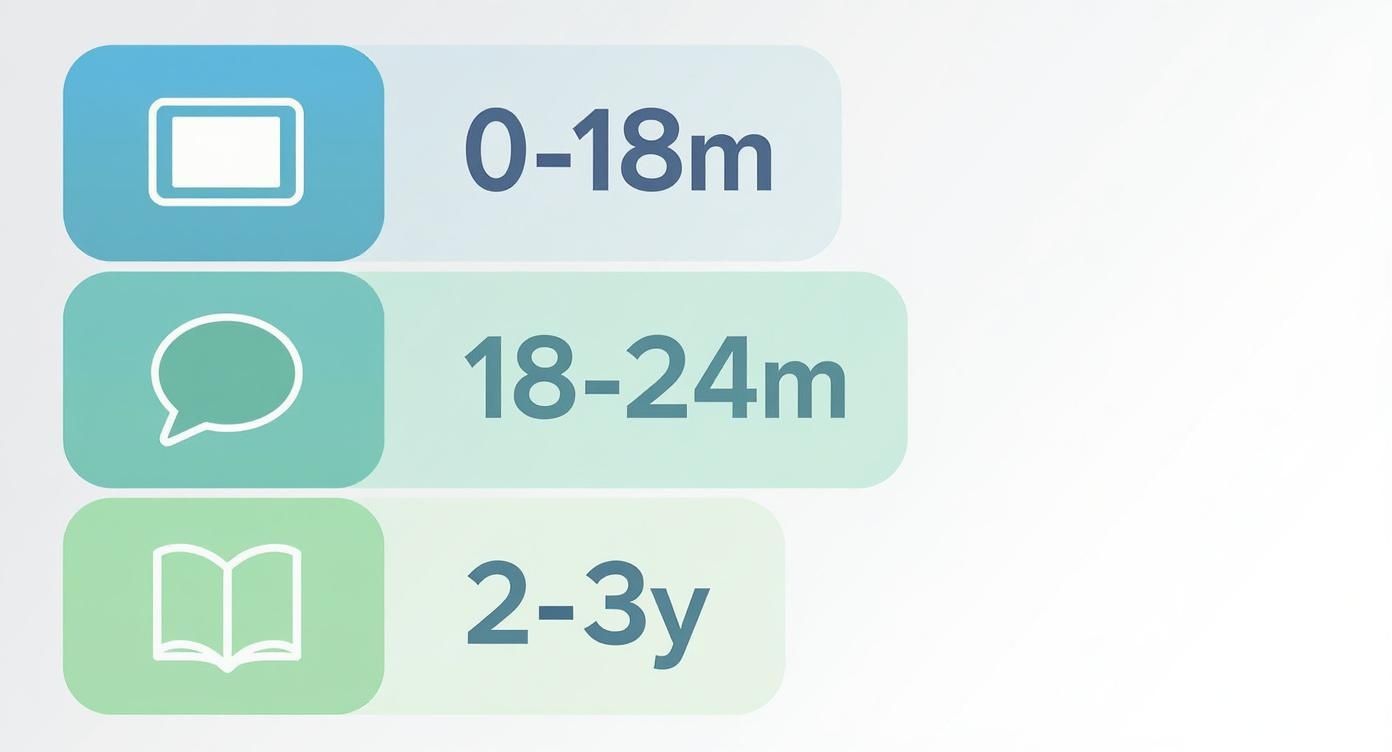
The big idea here is a slow, gradual approach. You start with zero screens for babies and only begin to introduce very high-quality, interactive content as they get closer to age three.
To make this even clearer, here’s a quick summary of the core principles for each stage.
Quick Guide to Islamic Screen Time Rules for Ages 0-3
| Age Group | Recommended Screen Time | Focus of Content | Practical Tip for Muslim Parents |
|---|---|---|---|
| 0–18 Months | Zero screen time, except for live video calls. | N/A | Use this precious time for dhikr, reciting Qur'an, and sensory play. Let them hear your voice and feel your touch. |
| 18–24 Months | Very limited, with a parent (e.g., 10-15 mins). | Simple nasheeds, alphabet songs (Arabic/English). | Watch together. Point things out on the screen and connect it to their world. Sing along with them. |
| 2–3 Years | Up to 30 minutes per day of co-viewed, high-quality content. | Islamic stories, interactive educational apps, shows with clear moral lessons. | Make it a special, shared activity. Talk about the lessons from the story of a Prophet afterwards. |
This table helps you see how the approach evolves, always keeping faith and connection at the center.
Building a Foundation of Faith and Connection
For children in this incredibly precious age group, every single moment is a chance to learn. They learn about Allah’s magnificent creation by touching the grass, feeling the rain on their skin, and hearing the birds sing. They build deep, secure bonds when they hear the warmth in your voice, see you smile, and feel your loving touch. Even the "best" educational content on a screen simply can't replace these vital, soul-deep experiences.
By thoughtfully managing screen time, you are not just following guidelines; you are actively preserving your child’s innocence, protecting their developing brain, and creating space for their fitra to flourish in a world of distractions.
This guide will walk you through the practical tools and give you the faith-based confidence to make choices that feel right for your family. Together, we'll figure out how to navigate this challenge with wisdom and purpose, ensuring technology serves your family's values, not the other way around.
How Screen Time Shapes Your Child's Brain and Fitra
Every parent watches in awe as their little one learns and grows. That first smile, the first wobbly step—it's all a beautiful sign of Allah’s intricate creation. This incredible development happens because a baby's brain is wired to learn from the real, three-dimensional world. It thrives on touch, taste, sound, and most of all, human connection.
Imagine your baby’s brain is like rich, fertile soil. Every real-world interaction—a cuddle, a story, the feeling of a new toy in their hands—is like planting a healthy seed. These experiences build strong pathways in their brain, laying the foundation for language, focus, and emotional health. This process is deeply intertwined with nurturing their fitra, their pure and natural God-given disposition.
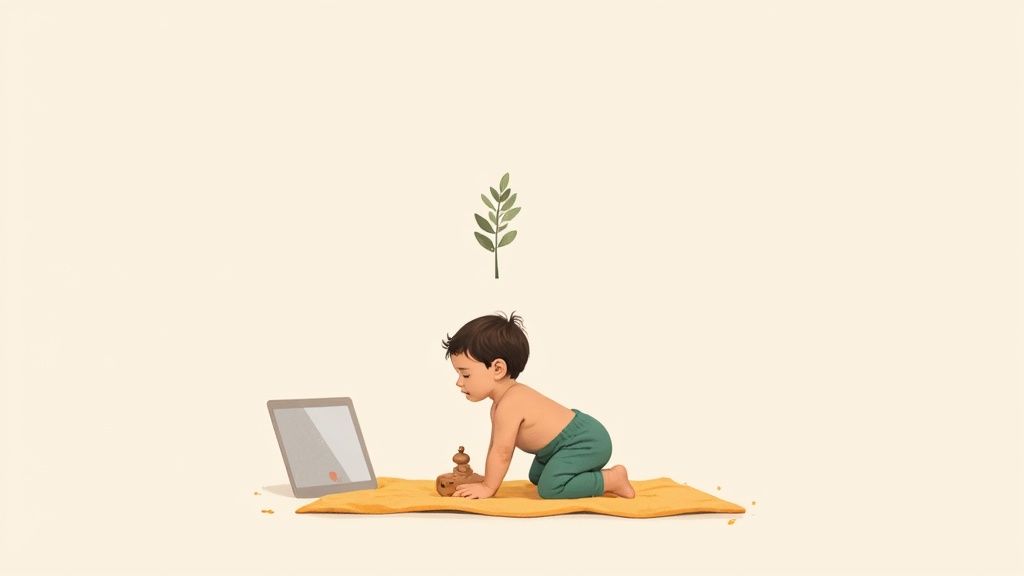
Screens, however, plant a very different kind of seed. They offer a whirlwind of flat, two-dimensional images that simply can't replicate the richness of reality. For a young mind designed for gentle, real-life learning, this can be overwhelming and lead to some real challenges down the road.
The Impact on Language and Connection
Language is so much more than just hearing words. It’s about your child watching your lips move, seeing your face light up, and engaging in those sweet "conversations" long before they can talk back. This is how they learn the beautiful rhythm of speech and the emotion behind your words.
When a toddler is glued to a screen, that vital, back-and-forth connection is lost. The screen talks at them, not with them. In fact, studies confirm that even background TV can reduce both the amount and the quality of interaction between parents and children, which can lead to delays in their language development.
A child learns to speak by connecting with you. When you name the objects around them, respond to their babbles, and share stories together, you are actively building the language centres in their brain. This is a loving, active exchange that a screen can never truly mimic.
This gets to the heart of why Islamic screen time guidelines are so protective of the under-three age group. They prioritise the sacred parent-child bond, which is the primary vehicle for all early learning and tarbiyah (upbringing).
Protecting Your Child’s Attention Span
Have you ever noticed how fast the scenes change in a kid's cartoon? The flashy colors, loud noises, and constant cuts are engineered to hijack attention. For a developing brain, this high-octane stimulation can set a completely unrealistic expectation for how the world works.
The real world moves at a much gentler pace and requires more from us. Learning to stack blocks takes patience and focus. A child who is used to the instant reward of a screen can find it much harder to stick with activities that require quiet concentration.
- Real-World Play: This is where focus, problem-solving skills, and patience are built. A child learns to try again when their tower of blocks comes tumbling down.
- Screen-Based Entertainment: This often fosters passive viewing and can actually shorten attention spans, making it more difficult for children to engage in deep, focused play later on.
By limiting screens, you're giving your child's brain the precious gift of time—time to develop the crucial skill of deep focus, which is essential for everything from prayer (Salah) to schoolwork in the years ahead.
Nurturing Social and Emotional Growth
A toddler learns about emotions by watching the most important people in their world: you. They see how your face lights up with joy, how you comfort their older sibling when they're upset, and how you handle frustration with patience. This is how they learn empathy, kindness, and how to navigate their own big feelings.
Screens often show a confusing and overly simplified version of emotions. Cartoon characters might solve complex problems in minutes or display exaggerated reactions that don't reflect real life. This can make it tougher for young children to pick up on subtle social cues and develop healthy emotional responses.
At the end of the day, the most important part of your child’s world is you. Your presence, your guidance, and your love are the most powerful tools you have for shaping their character and preserving their fitra. Following faith-based screen time guidelines isn't about restriction; it's a practical act of love to ensure they get what they need most: a deep, secure, and meaningful connection with their family.
Creating Your Family's Halal Screen Time Plan
Knowing the principles is one thing, but actually putting them into practice in a busy Muslim household? That's a whole different story. Moving from theory to real life calls for a clear, manageable plan that fits right into your family’s daily rhythm. Creating your own Islamic screen time guidelines isn’t about being overly strict; it's about being intentional and bringing a sense of calm and predictability to your day.
A solid family plan helps you set clear rules for when, where, and what your child can watch. This simple step can transform screens from a constant source of negotiation (and guilt!) into a structured, purposeful part of your routine. Toddlers thrive on this kind of consistency, and it empowers you to make decisions that truly reflect your values, even on the most tiring of days.

Defining Screen-Free Zones and Times
The easiest way to get started is by carving out sacred spaces and times in your home where screens are simply not invited. This small change does wonders to reduce temptation for everyone and reinforces the idea that some moments are just too precious for digital distractions.
Think about making these areas and times completely screen-free:
- The Prayer Area: This spot should be reserved for worship and quiet reflection, keeping it a zone of pure tranquility.
- The Dining Table: Mealtimes are a gift—a golden opportunity for connection, conversation, and showing gratitude (shukr) for the blessings Allah has given us.
- Bedrooms: Kicking screens out of sleeping areas is one of the best ways to protect your child’s sleep, which is absolutely vital for their healthy development.
- During Salah: When it's time to pray, all screens should be off. This models deep respect for this foundational pillar of our faith.
- The Hour Before Bed: Winding down without the harsh blue light from screens helps your toddler’s brain shift gears and prepare for a truly restful night.
Research has really underscored the value of this approach, especially as families try to find balance in our modern world. One study noted that during recent lockdowns, children's screen time shot up dramatically. In response, Islamic parenting experts have increasingly recommended creating screen-free zones and structured schedules to restore that balance. It’s a practice strongly supported by Islamic teachings on moderation, which always encourage meaningful activities over passive screen use. You can discover more insights from this study on Islamic early childhood education to better understand the context.
Understanding Halal Content for Toddlers
Once you've nailed down the "when" and "where," the next big piece of the puzzle is the "what." For our youngest children, it’s not enough for content to just be permissible. It needs to be beneficial. It helps to think of content in two simple categories.
- Beneficial (Value-Aligned) Content: This is the good stuff. It’s media that actively nurtures your child’s fitra (their innate, pure nature). It's typically slow-paced, calm, and teaches them something positive about their deen and the world around them.
- Permissible (Mubah) but Not Beneficial Content: This is the kind of stuff that isn't overtly harmful but offers no real value. Think of a flashy, fast-paced cartoon that might be overstimulating or just serves as a hollow distraction without any educational or spiritual benefit.
For the 0–3 age group, our goal should be to exclusively choose content from that first category. Every single minute of screen time should be purposeful, gentle, and nourishing to their developing mind and soul.
Practical Steps to Build Your Plan
Building your family’s plan doesn’t have to be complicated. It can be done in a few simple, thoughtful steps. Remember, this isn’t a rigid contract but a living guide that you can adapt as your child grows and your family’s needs change.
- Discuss with Your Spouse: The first step is always to get on the same page with your partner. Presenting a united front is crucial, as consistency is everything for toddlers.
- Start Small: Don't try to change everything all at once. Begin by introducing just one screen-free zone, like the dinner table, and slowly build from there.
- Find Halal Alternatives: Before you take away a screen, have a fun, screen-free activity ready to go. This could be a special puzzle, a favorite book, or even a simple basket of interesting household items for them to explore.
- Choose Content Carefully: Let’s be honest, finding truly beneficial media for this age group can be a challenge. If you need a hand, you might find our guide on finding Islamic content on YouTube Kids helpful for navigating the options safely.
By creating a clear and simple framework, you are doing so much more than just managing a device; you are mindfully shaping your home's environment. You are building a family culture where connection, faith, and real-world play are cherished above all else, inshaAllah.
Choosing Content That Nurtures Your Child's Soul
Once you’ve figured out when and where screens fit into your day, the real work begins: deciding what your child sees. This is where you graduate from being a timekeeper to a thoughtful curator of their earliest digital world. With a flood of content just a click away, filtering it through an Islamic lens is what makes screen time genuinely beneficial.
The goal here isn't just to keep your toddler busy. It’s to find something that quietly nourishes their soul and reinforces the beautiful values you hold dear.
Think about it like preparing a meal for your family. You wouldn't just toss random things from the cupboard onto a plate. You’d carefully choose fresh, wholesome ingredients. We need to bring that same level of care and intention to the media we serve our children.
Your Simple Halal Content Checklist
You don't need a complicated system to evaluate content. When you're looking at a new app, a YouTube channel, or a video, just run through these quick questions.
Does the content have:
- A Slow and Gentle Pace? A calm show with slow transitions is so much better for a developing brain than one filled with rapid cuts, jarring sounds, and flashy graphics. The real world doesn't move at a chaotic cartoon speed, and we want to protect our children's ability to focus and appreciate its natural rhythm.
- Simple Language and Concepts? The best programs for this age use clear, simple words and stick to one or two basic ideas at a time. This approach actually helps build their language skills instead of just overwhelming them.
- Positive Islamic Messages? Look for content that models good character (akhlaq), like saying Bismillah before eating, being gentle with animals, or showing respect to parents. These are the foundational values we want to plant early on.
- Voice-Only Nasheeds or No Music? For many Muslim families, avoiding musical instruments is a priority. Search for content that features acapella-style nasheeds or has no background music at all. This creates a calm and spiritually clean environment for your child.
True high-quality content for a Muslim toddler is more than just educational—it is spiritually nourishing. It should feel calm, purposeful, and reflective of the peaceful, gentle nature (fitra) that Allah has placed within every child.
What This Looks Like in Practice
So, how do you find this type of content? It can feel like searching for a needle in a haystack, but there are some wonderful options out there if you know what to look for.
Instead of generic alphabet songs, find one that teaches the Arabic letters. Instead of random cartoons, seek out simplified stories of the prophets or shows that introduce basic duas in a gentle way.
A recent study revealed that the average daily screen time for children and adolescents worldwide has reached a staggering 4.6 hours. The research also showed that parental education and awareness are the most effective tools for fighting the negative effects. This just goes to show how vital our role as informed gatekeepers really is.
Here are a few examples of beneficial content to search for:
- Arabic Alphabet and Numbers: Simple, slow videos introducing the sounds and shapes of Arabic letters.
- Stories of Allah's Creation: Content that explores the wonders of nature—animals, plants, the weather—and always links it back to Allah as the Creator.
- Simple Duas and Phrases: Shows that gently weave in phrases like Alhamdulillah, SubhanAllah, and simple supplications for everyday moments.
- Good Manners (Akhlaq): Age-appropriate stories that model kindness, sharing, and honesty in a way a toddler can actually grasp.
Finding these gems takes effort. For families wanting a shortcut, exploring the best Islamic apps for kids can be a fantastic starting point, as many of them have already done this filtering work for you. By being selective, you ensure that the few minutes of screen time your child does get are truly worthwhile, planting seeds of goodness that will, inshaAllah, grow for years to come.
Screen-Free Solutions for Real-Life Moments
We all know how it goes. The theory is great, but then real life happens. It’s that chaotic hour before Maghrib. You’re trying to get dinner on the table, an older child needs help with their homework, and your toddler is having a meltdown. In that moment, reaching for a phone or tablet feels like the only sane option. It’s completely understandable.
But the key to breaking our reliance on screens isn’t about having perfect, Pinterest-worthy activities planned out. It's about having a simple toolkit of screen-free alternatives ready to go. The goal is to find practical, no-fuss solutions that fit right into the natural rhythm of a busy Muslim home, turning moments of stress into opportunities for connection and gentle growth, inshaAllah.
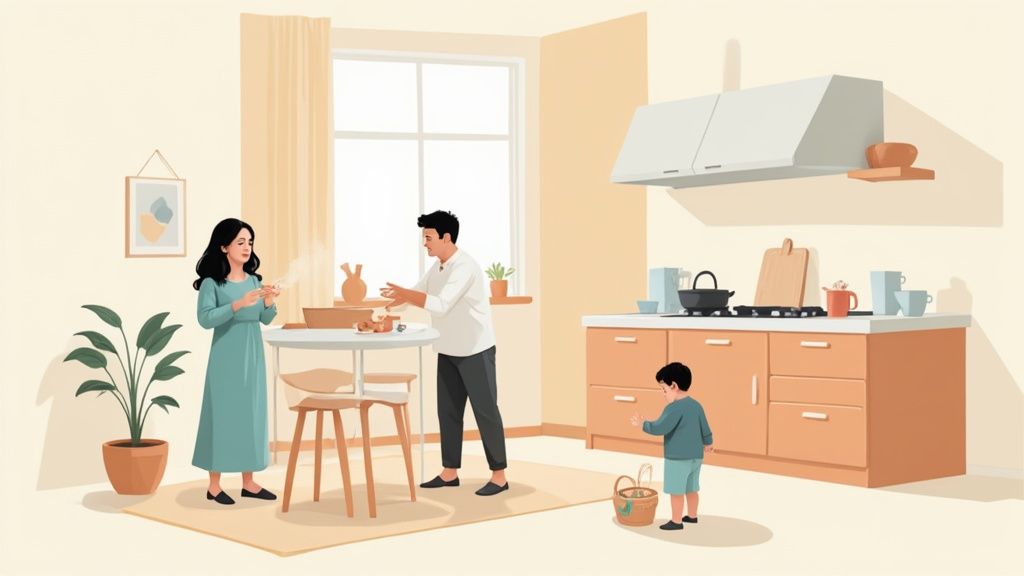
The Salah Scenario: Keeping Toddlers Calm
One of the most common struggles is keeping a little one occupied while you pray. A screen can feel like the only way to get five minutes of uninterrupted connection with Allah, but there are better, more faith-centered ways to create that sacred space. The trick is to have a special, engaging activity that is only available during prayer time.
Here are a few ideas for a "Salah Basket" you can keep near your prayer space:
- A Special Puzzle: Find a simple, chunky wooden puzzle that only comes out when you're about to pray. Its novelty will hold their attention.
- Lacing Beads: Large, colorful beads and a thick string are fantastic for developing fine motor skills and require quiet focus.
- Soft Islamic Books: A few board books with pictures of masjids, children praying, or stories about Allah’s creation can build a positive feeling around this time.
- A "Matching" Prayer Mat: Giving your toddler their own small prayer mat to sit on next to you helps them feel included in the ritual, even if they're just playing quietly on it.
When you create a predictable and positive routine around Salah, your child learns to respect this important time while engaging in something that’s actually good for their development.
The best screen-free solutions aren't about non-stop entertainment. They're about empowering your child with the tools for independent, imaginative play—a cornerstone for building a healthy and focused mind.
The Dinner Dash: Keeping Little Hands Busy
That last hour before dinner can feel like the longest of the day. You’re trying to cook, everyone's hungry, and having a toddler underfoot can make things pretty difficult. Instead of using a screen to keep them contained, try bringing them into the kitchen environment in a safe and constructive way.
A "Kitchen Helper Basket" can be a total lifesaver. Just fill a small basket or a low drawer with child-safe kitchen items they can explore while you’re cooking nearby.
What to Include in Your Kitchen Basket:
* Silicone Whisks and Spatulas: These are soft, safe, and endlessly fascinating for little hands.
* Plastic Measuring Cups: They're perfect for stacking, nesting, and pretending to cook right alongside you.
* A Small Pot and a Wooden Spoon: Let them "stir" some dry pasta or rice (with supervision, of course). This simple act of mimicking you makes them feel involved and important.
* Colorful Sponges (Clean and Dry): The texture and squishiness can be a fantastic sensory experience.
This approach doesn't just keep them busy; it builds positive feelings about the heart of the home. They learn through observation and play, all while you get dinner ready. For more ideas on how to weave these activities into your day, our guide on building a calm and predictable Muslim toddler routine is full of practical tips.
Building Your On-the-Go Toolkit
Let's be real—sometimes you need a solution outside the home. You might be at the doctor's office, in a long line at the store, or stuck in traffic. Having a small, pre-packed "busy bag" in your purse or car can stop you from handing over your phone out of pure desperation.
It doesn’t need to be fancy. A simple tote bag with a few rotating items is all you need:
1. A Miniature Board Book: Small enough to fit anywhere, but engaging enough to capture their attention for a few crucial minutes.
2. Sticker Sheets: Peeling and placing stickers is a great fine-motor activity. Reusable sticker pads are even better.
3. A Mess-Free Drawing Board: Magnetic or water-reveal pads give them the fun of creating without any of the cleanup.
4. A Favorite Small Toy: A little car, a finger puppet, or a small animal figurine can be a familiar comfort when they're in a new or boring place.
By preparing these simple, screen-free kits, you build your own confidence. You start to see that you can manage your toddler's needs without defaulting to a screen. Every time you choose connection and simple play over a digital distraction, you strengthen the calm, faith-centered home you’re working so hard to create.
Answering Your Questions About Islamic Screen Time
Even with a solid plan, real life happens. Tricky situations will pop up, and questions will nag at you. Navigating technology with faith means being ready for those moments, and it's perfectly normal to have these concerns. Let's walk through some of the most common worries Muslim parents face, with answers rooted in both child development and our beautiful Deen.
Is It Haram to Let My Baby Watch TV?
This is a question that weighs heavily on so many of us. Let's get straight to it: the screen itself isn't inherently haram. Technology is just a tool, and scholars generally agree that if it's used for something beneficial—in strict moderation—it can be permissible (halal).
The real heart of the issue, however, is our responsibility (amanah) as parents. For a child under three, almost any real-world activity is infinitely more valuable for their developing brain than a screen. Cuddling with you, hearing your voice, exploring a simple wooden block—these are the building blocks of their world.
So, while a few minutes of a calm, high-quality Islamic program isn’t a sin, the better question to ask is: what is my child missing out on during that screen time? Prioritizing real-world connection and play will always be the superior choice for their dunya and akhirah.
What About Video Calls with Grandparents?
This is a wonderful and important exception. Video calls are in a completely different category from passive TV watching. Both child development experts and Islamic scholars view this kind of screen use very positively because it's interactive and relational.
It’s a living, breathing way to maintain precious family bonds (silat al-rahim), which is an act deeply beloved in Islam. A live chat with Nani, Jaddah, or Jaddoo helps your child connect a loving face to a familiar voice, strengthening those crucial family ties, even across continents. It's not just screen time; it's family time.
To make these calls even better:
- Make it engaging: Ask grandparents to sing a familiar nasheed, read a short story, or play a game like peek-a-boo through the camera.
- Keep it short and sweet: A focused 10–15 minute call is often far more meaningful for a toddler than a long, rambling chat.
- Sit with your child: Participate in the call with them. Point to the screen, repeat names, and help them interact. Your presence makes the experience so much richer.
How Do I Handle Screen Time Pressure from Family?
It can be really tough when you're visiting family or friends who have a different approach to screens. Maybe the TV is constantly on in the background, or a well-meaning uncle keeps trying to hand your toddler his phone. Navigating this requires kindness, confidence, and a bit of a game plan.
First, remember that you know your child best. You have every right to set boundaries that feel right for your family, and you can do it without making anyone feel judged.
Here are a few gentle but firm phrases you can have ready:
"That's so kind of you to offer, but we're trying to focus on more hands-on play with him right now."
"We're actually on a little screen break at the moment. Could we play with [a toy] instead?"
"She gets a bit overstimulated from screens, so we try to limit them. It’s just what works for her."
Staying calm and polite is key. Your consistency is part of the modern challenge of parenting with intention, and holding to your values with grace is a true strength.
Are Islamic Cartoons Okay for My Toddler?
This is a great question. It shows just how much thought you're putting into curating what your child sees. While the intention behind Islamic cartoons is wonderful, we still have to think about the medium itself.
Most cartoons, even the "Islamic" ones, are designed with fast pacing, bright flashing colors, and quick scene changes that can be overwhelming for a toddler's developing brain. For children under three, the real world is their most powerful teacher. They learn about Allah’s creation by touching a real leaf, not by seeing a 2D version of one. They learn about kindness by watching you interact with others, not a cartoon character.
If you decide to introduce an Islamic cartoon as your child gets closer to age three, make sure you:
- Preview it first. Look for shows that are exceptionally slow-paced, visually calm, and use simple, gentle language.
- Watch it together. Don't just turn it on and walk away. Talk about what’s happening to help them make sense of it all.
- Keep it very short. A single 5–10 minute segment is more than enough for this age.
Think of most Islamic cartoons as being more appropriate for older, preschool-aged children. For your baby or toddler, nothing beats real-life interaction and purposeful play for nurturing their fitra.
Raising a young Muslim in this era is a unique journey, but you don't have to do it alone. Tools designed by fellow Muslims can make it easier. Babymode offers a safe, ad-free, and halal screen time solution built specifically for children aged 0–3. With AI-generated stories that are gentle, slow-paced, and reviewed for Islamic values, you can have peace of mind knowing the content is always beneficial.
Join the Babymode waitlist for early access and special launch pricing.
